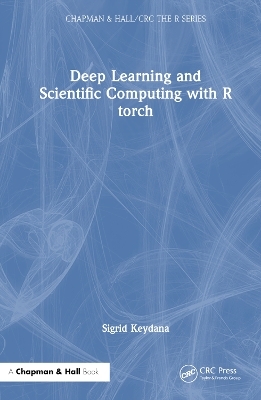
Deep Learning and Scientific Computing with R torch
Chapman & Hall/CRC (Verlag)
978-1-032-23138-9 (ISBN)
torch is an R port of PyTorch, one of the two most-employed deep learning frameworks in industry and research. It is also an excellent tool to use in scientific computations. It is written entirely in R and C/C++.
Though still "young" as a project, R torch already has a vibrant community of users and developers. Experience shows that torch users come from a broad range of different backgrounds. This book aims to be useful to (almost) everyone. Globally speaking, its purposes are threefold:
Provide a thorough introduction to torch basics – both by carefully explaining underlying concepts and ideas, and showing enough examples for the reader to become "fluent" in torch
Again with a focus on conceptual explanation, show how to use torch in deep-learning applications, ranging from image recognition over time series prediction to audio classification
Provide a concepts-first, reader-friendly introduction to selected scientific-computation topics (namely, matrix computations, the Discrete Fourier Transform, and wavelets), all accompanied by torch code you can play with.
Deep Learning and Scientific Computing with R torch is written with first-hand technical expertise and in an engaging, fun-to-read way.
Sigrid Keydana is an Applied Researcher at Posit (formerly RStudio, PBC). She has a background in the humanities, psychology, and information technology, and is passionate about explaining complex concepts in a concepts-first, comprehensible way.
Part 1. Getting familiar with torch 1. Overview 2. On torch, and how to get it 3. Tensors 4. Autograd 5. Function minimization with autograd 6. A neural network from scratch 7. Modules 8. Optimizers 9. Loss functions 10. Function minimization with L-BFGS 11. Modularizing the neural network Part 2. Deep learning with torch 12. Overview 13. Loading data 14. Training with luz 15. A first go at image classification 16. Making models generalize 17. Speeding up training 18. Image classification, take two: Improving performance 19. Image segmentation 20. Tabular data 21. Time series 22. Audio classification Part 3. Other things to do with torch: Matrices, Fourier Transform, and Wavelets 23. Overview 24. Matrix computations: Least-squares problems 25. Matrix computations: Convolution 26. Exploring the Discrete Fourier Transform (DFT) 27. The Fast Fourier Transform (FFT) 28. Wavelets
| Erscheinungsdatum | 20.03.2023 |
|---|---|
| Reihe/Serie | Chapman & Hall/CRC The R Series |
| Zusatzinfo | 6 Tables, black and white; 59 Line drawings, black and white; 32 Halftones, black and white; 91 Illustrations, black and white |
| Sprache | englisch |
| Maße | 156 x 234 mm |
| Gewicht | 925 g |
| Themenwelt | Informatik ► Theorie / Studium ► Künstliche Intelligenz / Robotik |
| Mathematik / Informatik ► Mathematik | |
| Technik ► Elektrotechnik / Energietechnik | |
| Technik ► Umwelttechnik / Biotechnologie | |
| ISBN-10 | 1-032-23138-6 / 1032231386 |
| ISBN-13 | 978-1-032-23138-9 / 9781032231389 |
| Zustand | Neuware |
| Haben Sie eine Frage zum Produkt? |
aus dem Bereich


